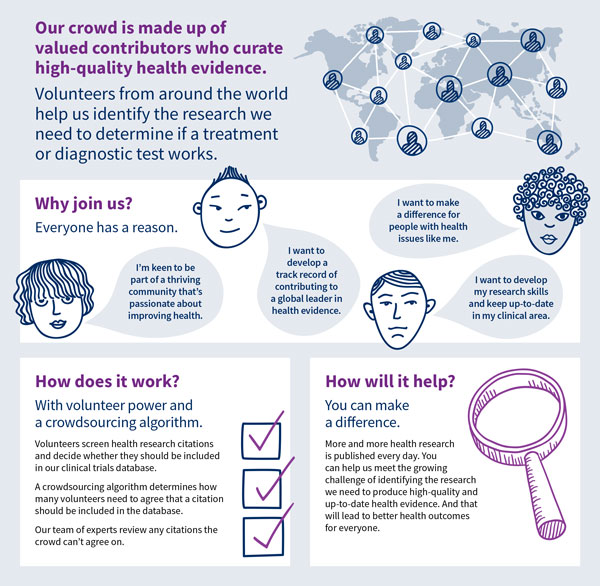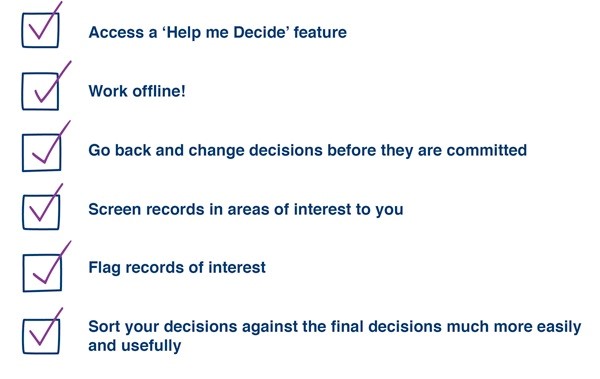Please find below some further information relating to the recent Cochrane Steering Group (CSG) decisions on the Cochrane-wide Structure and Function Review prepared by the Central Executive Team, and now made freely available.
Cochrane’s existing Group structure (Cochrane Review Groups (CRGs), Centres & Branches, Fields & Networks, and Methods Groups) and ways of working have served the organization well in its first two decades; but the CSG has decided that Cochrane needs to embark on structural change to meet the challenges of the future and to deliver the goals and objectives of our Strategy to 2020. Our vision is to refine our review production systems so that they are able to produce high quality, relevant reviews more rapidly and efficiently; and to create an environment and a more integrated, flexible organizational structure that provides maximum support and opportunities for our most precious resource – our contributors. The CSG has endorsed the three proposals for structural and functional change set out in the paper:
- the introduction of new approaches to editorial processing, including elements of centralization and separation of editorial and developmental roles;
- the consolidation of Cochrane Groups into geographic and topic-based networks; and
- The introduction of greater flexibility in the way Groups work by allowing a choice of workstreams that they can undertake.
However, we recognize that there remains considerable work to be done to establish the exact blueprint and the best ways that we will achieve these changes. A detailed paper, including recommendations on the precise approaches to be taken and an estimation of the resource requirements for the changes, will be presented to CSG in Seoul in October. To do that, members of the Central Executive Team will work with collaborators from across Cochrane to refine, evaluate, and improve the proposals. The consultations will start in a few weeks, and will include multiple webinars and other opportunities aimed to ensure an inclusive process, particularly in relation to geographic and linguistic diversity. We also intend to consult with selected external stakeholders, including funding organizations.
There are a number of key principles that are important to how we will deliver this vision:
- This needs to be a Cochrane-wide discussion. Change needs to be implemented across Cochrane, not just in CRGs. For some of you, such as those working in Centres, Branches, and in the Consumer Network, the changes will align with those already being planned and made in the Group Structure & Function Reviews.
- These structure and function changes need to integrate seamlessly with the other changes and projects we are implementing as part of our Strategy to 2020 activities.
- Bringing Cochrane Groups together provides opportunities for increasing the Groups' combined independence and interdependence and their capacity to identify their own solutions.
- There are many examples of excellence across Cochrane. These changes are about sharing best practice, using the resources we have as effectively as possible, and working more effectively together.
- Cochrane needs to attract and retain motivated and skilled researchers, by providing career and professional development opportunities, if it is to build a sustainable future.
We need and encourage you to contribute your thoughts and ideas to the development of these vitally important plans. You can make any comments, and ask any questions, by emailing strategy@cochrane.org and we will respond as soon as possible.
There is clearly a great deal of work ahead; but we hope that you are as excited as we are by the new opportunities and increased potential for Cochrane to achieve its mission that these changes will create. We hope that you will be prepared to work together with us and colleagues across the collaboration to achieve our shared ambitions.
Best wishes,
Lisa Bero and Cindy Farquhar, Co-Chairs, Cochrane Steering Group
Mark Wilson, CEO, Cochrane
David Tovey, Editor in Chief, Cochrane Library / Deputy CEO, Cochrane
25 April 2016
Read the full paper: Review of the Structure and Function of Cochrane Groups















